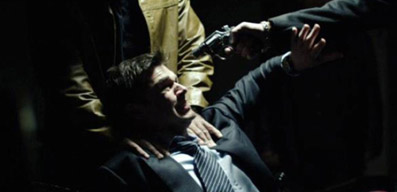|
This shockingly shoddy, adolescent attempt at giving a run-of-the-mill British crime thriller a bit of American spit 'n' polish is so bogged down in cliché and caricature that stunningly, neither the ineffective pilfering of Michael Mann's visual style or the astounding revelation that it took three directors to concoct this crap counts as the film's grossest offence.
The co-writing and directing team of Mark Cripps, David Ellison and James Marquand* must all be held be held equally accountable for this bungled story of deceit and double-crossing convolutedly told. Found wanting in coherence, intelligence and genuine surprises, it's not so much that too many cooks spoil the broth, it's that their grab bag ingredients are so stale to begin with, that no amount of faux American slickery can overcome them.
At a slim eighty-four minutes, the simple deception of two men unwittingly set up to kill one another by a third amounts to little more than a laborious slog of tension-deflating flashbacks, each triggered by stock sound effects imprudently lifted from decade-old action trailers. All that's missing is the unmistakable twenty-packs-a-day gravel tone of maestro Don LaFontaine and the obligatory "in a world..." narration. Even by such dated standards, the film falls embarrassingly flat on its face.
For the filmmakers, the intended point of reference is clearly Michael Mann's Heat, yet no amount of dusky blue filters are likely to convince anyone that the A40 bears even a passing resemblance to the LAX freeway. Mann's stylish aesthetic is substituted for the ersatz production values of an Orange phone parody, directed with roughly the same risible mimicry of impressionable schoolboys waving their water pistols around, after seeing Reservoir Dogs for the first time. The precipitous downslide occurs as early as the opening shot, the initial Brian Eno-like soundscape abandoned for telegraphed overscoring, characteristic of new-era BBC staples, Spooks and Doctor Who, thus confirming the film's drab televisual aesthetic. The general lack of atmosphere extends to every aspect of the film; an easy to foretell cat-and-mouse chase as unimpressionable as the nondescript London locales that serve as its backdrop.

We first meet milquetoast protagonist Ian Drake, pleading for his life and begging a back alley kingpin (Mark Womack) for mercy. Tied to a chair with a gun rammed in his face, snivelling seems very much Drake's natural disposition, irregardless of threats on his life. The kind of enfeebled runt who brings out the inner bully in everyone he meets. Whenever his cockney barmaid fuck buddy squawks his forename, it evokes the contemptible gutlessness of his Eastenders namesake Beale, making the comical mismatch of his videogame hard nut surname stand out all the more.
Accused of killing the crime boss' father during a break-in, Drake protests his innocence with variant inflections of the f-word, insisting another man caught on the security camera that same night is the perpetrator. It's an exasperating scene of shouty, sweary, gobby gun-toting that sets the tone for the rest of the picture and pigeonholes it as another depressing example of British, gangster lite chest puffing, sure to give Henry Hill and his Goodfellas cause to chuckle.
Managing to convince his captor he's got the wrong man, he's charged with eliminating the real killer, but as played by Kenny Doughty, Drake's a preening baby face straight out of the Marks and Spencers autumn/winter collection, unconvincing as a beleaguered victim, much less one capable of murder. Ordinary men thrown into limit-testing circumstances has long been a set up of inherent dramaturgical urgency that's easy to respond to, permitted it doesn't throw all plausibility out the window as it does here. It's not helped by the fact that the only thing deadly about his killed-or-be-killed adversary is his perpetual look of quotidian hopelessness. As a gumtree hit man, Ingvar Eggert Sigurðsson looks like a bricklayer who's wandered in from an Aki Kaurismäki film, hardly a dangerous assassin.
As an example of the genre, the film itself is just as pedestrian – at times downright inept. Even during the Brit gangster boom of the early 00's, and the subsequent wannabe hard man reign of Danny Dyer, I Against I would surely have ranked an all time low of lads mag big screen fatuousness. In 2012 it deserves nothing better than the petrol station bargin bin.
* the apple fell far, far from the tree in this case, his father having famously directed Return of the Jedi.
|